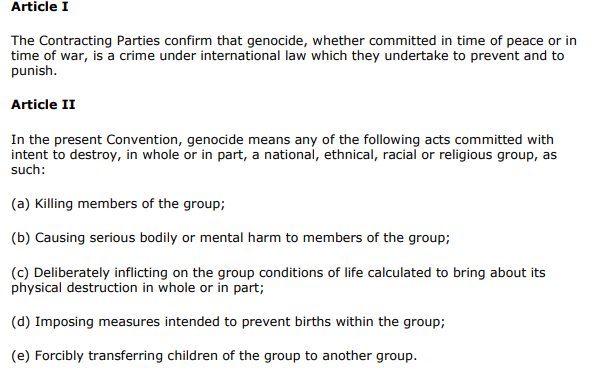The 1946 General Assembly Resolution -
In the aftermath of World War 2, the United Nations General Assembly passed - United Nations General Assembly Resolution 96. This began -
"Genocide is a denial of the right of existence of entire human groups, as homicide is the denial of the right to live of individual human beings; such denial of the right of existence shocks the conscience of mankind, results in great losses to humanity in the form of cultural and other contributions represented by these human groups, and is contrary to moral law and to the spirit and aims of the United Nations.
Many instances of such crimes of genocide have occurred when racial, religious, political, and other groups have been destroyed, entirely or in part.
The punishment of the crime of genocide is a matter of international concern."
The General Assembly then affirmed -
"that genocide is a crime under international law which the civilized world condemns, and for the commission of which principals and accomplices - whether private individuals, public officials or statesmen, and whether the crime is committed on religious, racial, political or any other grounds --are punishable"
UN member States were invited to "enact the necessary legislation for the prevention and punishment of this crime"
The 1948 Convention -
The text of the Convention for the Prevention and Punishment of the Crime of Genocide was adopted by the United Nations General Assembly on 9 December 1948. After obtaining the requisite twenty ratifications required by article XIII, the Convention entered into force on 12 January 1951.
Convention on the Prevention and Punishment of the Crime of Genocide.pdf
Definition -
The definition of Genocide appears in Article II of the Convention -
Article III to VII -
Article III - The following acts shall be punishable:
(a) Genocide;
(b) Conspiracy to commit genocide;
(c) Direct and public incitement to commit genocide;
(d) Attempt to commit genocide;
(e) Complicity in genocide.
Article III therefore imposes an obligation upon the Contracting Parties to punish not only the perpetration of genocide but also conduct linked to the crime - conspiracy, incitement, attempt etc.
Article IV
Persons committing genocide or any of the other acts enumerated in article III shall be punished, whether they are constitutionally responsible rulers, public officials or private individuals.
Article V
The Contracting Parties undertake to enact, in accordance with their respective Constitutions, the necessary legislation to give effect to the provisions of the present Convention, and, in particular, to provide effective penalties for persons guilty of genocide or any of the other acts enumerated in article III.
The United Kingdom offers an example of such national legislation - International Criminal Court Act 2001 Part 5 - (replacing the Genocide Act 1969).
Article VI
Persons charged with genocide or any of the other acts enumerated in article III shall be tried by a competent tribunal of the State in the territory of which the act was committed, or by such international penal tribunal as may have jurisdiction with respect to those Contracting Parties which shall have accepted its jurisdiction.
This article plainly envisaged the creation of a future international penal tribunal. That had to wait 50 years - until 1998.
Article VII
Genocide and the other acts enumerated in article III shall not be considered as political crimes for the purpose of extradition. The Contracting Parties pledge themselves in such cases to grant extradition in accordance with their laws and treaties in force.
Articles VIII to XVIII are not considered here - (see them via the link above).
Dual responsibility -
An important judgment on the Convention is BOSNIA v SERBIA decided by the International Court of Justice in 2007.
091-20070226-JUD-01-00-EN.pdf (icj-cij.org)
This is a lengthy, detailed judgment but is essential reading for anyone seeking a full understanding of this topic.
Crucially, the court adopted a wide view of the convention and held that it imposed not only an obligation on individuals but also on contracting parties to refrain from engaging in genocide.
The same act(s) may therefore give rise to both individual and State responsibility.
Merits of the convention and problems -
1. There is a definition of genocide
2. Acts connected to genocide are also punishable - e.g. conspiracy, incitement etc
3. Genocide is not confined to war - it may be committed at any time
4. Genocide may be committed by constitutionally responsible rulers and State officials
5. As interpreted by the ICJ, the convention imposes liability on the contracting parties as States.
Problems lie within the definition. These include the absence of definition as to what constitutes the groups against which genocide may be perpetrated - i.e. national, ethnical, racial, and religious.
Further problems lie with defining the elements of the offence including the question of whether acts of genocide require an underlying genocidal policy by a State.
Tribunals -
A number of tribunals have been created to try allegations of genocide. These include the International Tribunal for the former Yugoslavia, the International Criminal Tribunal for Rwanda, and certain bodies.
Home | United Nations International Criminal Tribunal for Rwanda (irmct.org)
Today, there is a Residual Mechanism - Home | UNITED NATIONS | International Residual Mechanism for Criminal Tribunals (irmct.org) - mandated to perform a number of essential functions previously carried out by the International Criminal Tribunal for Rwanda (“ICTR”) and the International Criminal Tribunal for the former Yugoslavia (“ICTY”).
The judgments of the various Tribunals have dealt with numerous aspects of the law relating to genocide.
International Criminal Court -
Article 6 of the Rome Statute of the International Criminal Court adopts the 1948 Convention definition of genocide.
Rome_Statute_English.pdf (icc-cpi.int)
Background information -
Background and basic information may be seen in material prepared by Professor William A. Schabas at - Convention on the Prevention and Punishment of the Crime of Genocide
Further post -
Watching the Law: Genocide - (2) - The elements of the offence
4 April 2022


No comments:
Post a Comment